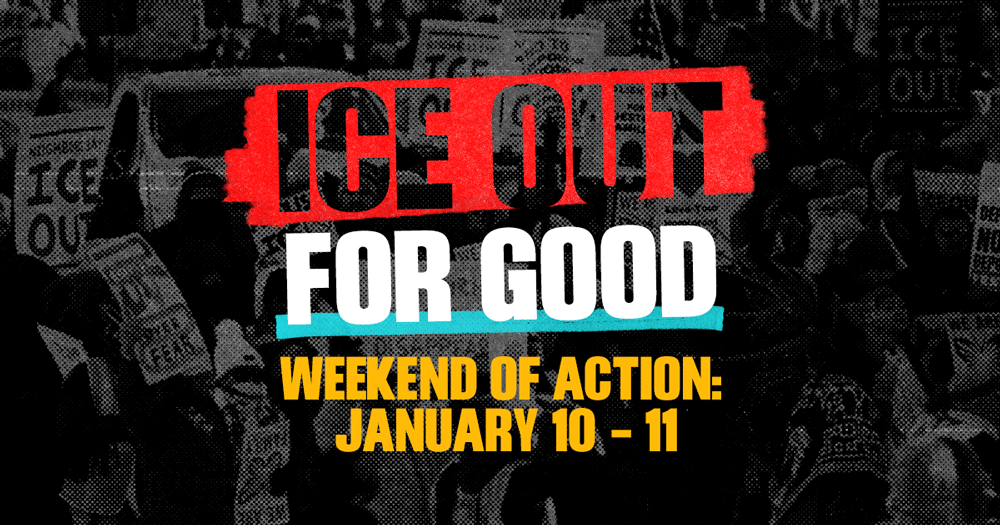antiracismdsa
Our struggle is to bring social, political, and economic justice to our nation. This is an effort of the Chicano/Mexican American Digital History Project. https://sites.google.com/site/chicanodigital/
Monday, February 23, 2026
The Reality Check: BLOCKADES SHUT DOWN MEXICAN HIGHWAYS
Thursday, January 15, 2026
Choosing Democracy: How To Mobilize Against Fascism
Friday, January 09, 2026
ICE Out Now
Last night, over 35,000 people joined an emergency organizing call to respond to the horrific killing of Renee Nicole Good by ICE and the escalating violence of Trump’s secret police force in Minneapolis and immigrant communities across the country.
Everyone on the call was clear-eyed about the huge amount of work ahead of us to confront the public menace of an increasingly lawless agency that rampages through communities, targets schools and daycare centers, and commits violence with seeming impunity.
We need more defiance at the state and local level. We need to target ICE’s funding at the federal level. And right now, we need to be in the streets shining a light on ICE’s pattern of unchecked violence, raising our voices to demand: ICE OUT FOR GOOD.
That’s why Indivisible and a broad coalition of partners are banding together for the nationwide ICE Out For Good Weekend of Action this Saturday and Sunday. We hope you’ll join us.
|
| Use our toolkit to host an event |
What’s happening this weekend
We’re coming together for hundreds of daytime events this Saturday and Sunday to mourn the lives ICE has taken and destroyed. Renee Nicole Good’s tragic death this week was not an isolated incident; over the past year federal agents have shot numerous people -- two in Portland just yesterday. Thirty-two have died in ICE custody. Many, many more have had their lives shattered by detention, family separation, and deportation.
Our Weekend of Action will honor all those impacted by ICE brutality, raise awareness of this ongoing pattern of violence, and demand justice and accountability.
The events will take a variety of forms determined by each volunteer-host. They will include:
- Public vigils and memorials
- Silent marches and processions
- Visual actions and installations
- Faith-based events
- And more -- hosts are encouraged to dream up creative, attention-grabbing ideas.
What we’re demanding
Our Weekend of Action will call for:
- Accountability, transparency, and immediate independent investigations into the killing of Renee Nicole Good
- Increased action from elected officials to rein in ICE
- In the words of Minneapolis Mayor Jacob Frey, for ICE to "get the $&@% out" of our cities.
What you can do
We need the response to this week’s killing and ongoing ICE violence to be loud, peaceful, and inescapable. So if you’re physically able, we need you to be out in the streets.
- Visit the ICE Out For Good Mobilize Hub to find the event nearest you. Check back often, as events are being added by the hour.
- No event near you? Host one. Use our event toolkit to plan your event, and then register it on Mobilize so others can find it.
- Make sure you know your rights before heading out this weekend. We encourage everyone hitting the streets this weekend (or attending any protest under this regime) to attend the ACLU’s virtual Know Your Rights training today (Jan 9) at 8p ET / 5pm PT.
- Help spread the word. Post the sign up for the Weekend of Action across your networks, send it to friends and family.
| A core principle behind all ICE Out For Good events is a commitment to nonviolent action and no civil disobedience. We expect all participants to seek to de-escalate any potential confrontation with those who disagree with our values, and to act lawfully at these events. Weapons of any kind, including those legally permitted, should not be brought to events. All events should be held in public spaces or on public property. |
This weekend, we'll show the regime and their enablers just how widespread the opposition to their brutality is; we'll put steel in the spines of our Democratic local, state, and national leaders; and we'll send a message to anyone targeted and terrorized by ICE: You are not alone.
Let’s get out there together. Let’s continue the fight until we get ICE Out For Good.
In solidarity,
Indivisible Team
* Events are being added all the time, so if there’s nothing near you now and you’d prefer not to host one, check back in a few hours.

